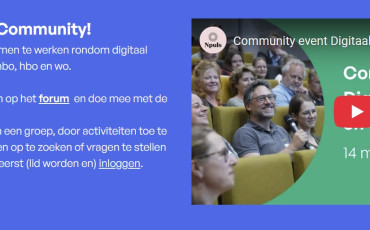i-SPOT will be a computer application for practicing communication skills that involves responding via webcam to short video clips in which someone says something to you. Your responses are recorded, so you can view them afterwards and repeat them if you are not happy with them. It also enables you to compare your own response to those of experts, and see the most common mistakes people make in that situation. If you are satisfied with your response, you can share your video with fellow students and/or the lecturer to receive feedback. The feedback you give each other, too, is recorded using your webcam.
Who is it for?
The program can be used in any educational context where there is a focus on training verbal communication skills, as the content can be adapted to the type of training. Psychology students at the Open University are practicing ways of responding in a nuanced and empathetic way to a client presenting a personal problem. In the case of sales training, practice could involve dealing with a complicated query from a customer; media training could help you learn to deal with tricky questions from journalists, and so on – depending on your specific field.
What does it add to the training that is currently being provided?
You might be thinking: ‘But surely talking to a video is not the same thing as talking to a real person, whose responses might throw up some new conundrums?’ You are completely right, of course. We do not think that this tool can replace practicing conversations in person. It does, however, make for a great way to practice as a ‘dry run’. As we said before, you can formulate what you would say in the safety and comfort of your own home, and then see how it sounds and how you might improve it. This will boost your confidence, enabling you to show up to the training sessions better prepared and reap the full benefits of the in-person training.
How far have we got?
We are still working out the kinks in the scheduling. In early February, the practical lesson groups in which we will be testing the program will begin. After having had to wait a long time to be able to connect up to the software of a new OU video server, we are currently hard at work on the pilot version of the program. The video clips have already been recorded. We also have ambitious plans for finding out whether it works. In addition to reviewing student satisfaction, we want to investigate how well the program improves students’ communication skills and their confidence about patient interaction. We will be monitoring the progress in their communication skills using a behaviour test. If we can’t use the behaviour test, we can switch to a plan B, which uses reports written by the students instead. This means that we will get insight into their development no matter what. It should be clear from the above, however, that there is a lot of work still to be done. Hang on, my laptop has started talking to me again – time for me to get back to work.
Innovation scheme: Digital Assessment for customised education
This is one of the 9 projects from the SURFnet ‘Digital Assessment for customised education’ innovation scheme. As part of this scheme, between 1 July 2015 and 1 July 2016 higher education institutions will be experimenting with the use of digital assessment in designing customised education, improving education quality and the fit between learning/teaching methods and the requirements of students and lecturers.
About the author
Mark Hommes works as a university lecturer at the Open University’s Faculty of Psychology and Education. His responsibilities include the development of the practical lessons relating to practitioner-patient interaction and psychodiagnostics.



0 Praat mee